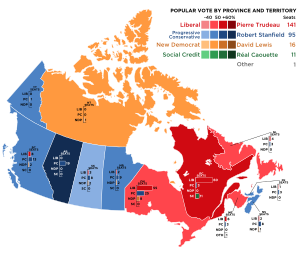Canadian federal election, 1974
|
|
|||||||||||||||||||||||||||||||||||||||||||||||||||||||||||||||||||||||||||||||||||
|---|---|---|---|---|---|---|---|---|---|---|---|---|---|---|---|---|---|---|---|---|---|---|---|---|---|---|---|---|---|---|---|---|---|---|---|---|---|---|---|---|---|---|---|---|---|---|---|---|---|---|---|---|---|---|---|---|---|---|---|---|---|---|---|---|---|---|---|---|---|---|---|---|---|---|---|---|---|---|---|---|---|---|---|
|
|||||||||||||||||||||||||||||||||||||||||||||||||||||||||||||||||||||||||||||||||||
|
|
|||||||||||||||||||||||||||||||||||||||||||||||||||||||||||||||||||||||||||||||||||
|
264 seats in the 30th Canadian Parliament 133 seats needed for a majority |
|||||||||||||||||||||||||||||||||||||||||||||||||||||||||||||||||||||||||||||||||||
| Turnout | 71.0% ( |
||||||||||||||||||||||||||||||||||||||||||||||||||||||||||||||||||||||||||||||||||
|
|||||||||||||||||||||||||||||||||||||||||||||||||||||||||||||||||||||||||||||||||||

|
|||||||||||||||||||||||||||||||||||||||||||||||||||||||||||||||||||||||||||||||||||
|
|||||||||||||||||||||||||||||||||||||||||||||||||||||||||||||||||||||||||||||||||||
The Canadian federal election of 1974 was held on July 8, 1974 to elect members of the Canadian House of Commons of the 30th Parliament of Canada. The governing Liberal Party was reelected, going from a minority to a majority government, and gave Prime Minister Pierre Trudeau his third term. The Progressive Conservatives, led by Robert Stanfield, did well in the Atlantic provinces, and in the West, but the Liberal support in Ontario and Quebec ensured a majority Liberal government.
A key issue in the election was controlling spiralling inflation. Stanfield had proposed a "90-day wage and price freeze" to break the momentum of inflation. Trudeau had ridiculed this policy as an intrusion on the rights of businesses and employees to set or negotiate their own prices and wages with the catch-phrase, "Zap! You're frozen!" In 1975, Trudeau introduced his own wage and price control system under the auspices of the "Anti-Inflation Board".
The New Democratic Party, led by David Lewis, lost less than two-and-a-half percentage points in the popular vote, but almost half of their seats in the House of Commons.
The Social Credit Party of Canada, led by Réal Caouette, continued to lose ground, and fell to 11 seats, one short of the number required to be recognized as a party in the House of Commons (and therefore qualify for research funds and parliamentary committee memberships). This status was nonetheless extended to the party by the governing Liberals, who believed that Social Credit's support came primarily at the expense of the Tories.
...
Wikipedia




